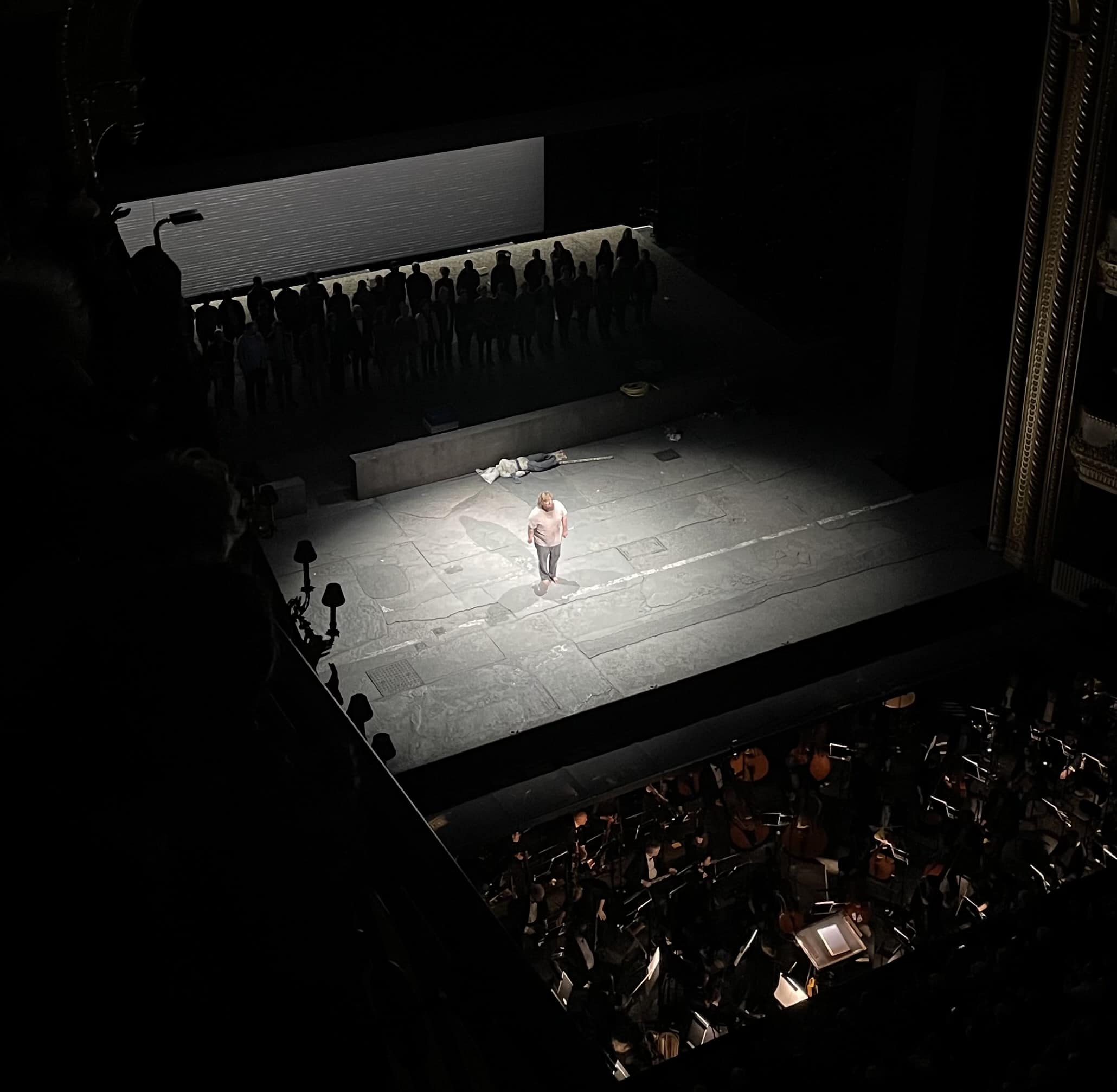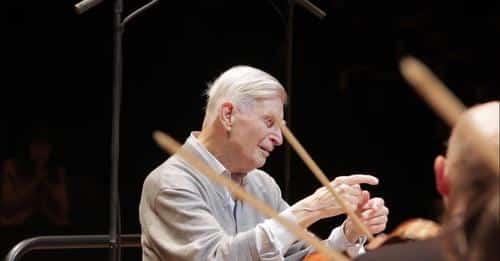Is London’s Peter Grimes greater than Vienna’s?
NewsHugh Kerr of Edinburgh Music Review has seen both Kaufmann and Clayton.
Here’s his verdict:
A few weeks ago I reviewed for Slipped Disc the last night of Peter Grimes from Vienna, it is a rather limp old conceptual production ,but was saved by the great singing of Jonas Kaufmann, Lise Davidsen and Bryn Terfel and the wonderful sound of the Vienna Philharmonic. It was I declared the best Grimes I had seen and I’ve seen quite a few going back to Jon Vickers at Covent Garden.
Last night I saw the last night of Peter Grimes at Covent Garden. It’s had rave reviews but I was sceptical, could Allan Clayton match Kaufmann, could Maria Bengtson as Ellen Orford compare to the finest soprano in the world Lise Davidsen? Would Deborah Warner’s “ theatrical” production updating Grimes to the present time work or subvert the opera?
Well, I was wrong in my doubts. This is the greatest Peter Grimes of our time and maybe of all time, even Britten’s in 1945. Yes Allan Clayton is not as good a singer as Jonas Kaufmann, but he sounded more authentically English than Kaufmann and his appearance and acting convinced you that he was a tortured soul destined to drown.Maria Bengtson is not as good a singer but again was more authentic than Davidsen and gave the impression of a weak woman under pressure. Bryn Terfel was just as good as Balstrode as he was in Vienna and it was great to see John Tomlinson dominating the stage as Swallow.
The chorus at Covent Garden were far superior to Vienna and the Covent Garden orchestra under Mark Elder were superior to the Vienna Philharmonic and were greeted by a roar before the final act. Above all Deborah Warner’s updated production did not trash the opera as some modern opera productions have done at Covent Garden ( Katie Mitchell’s Lucia for one!) instead it enhanced the drama which makes Grimes a great opera, occasionally it went over the top ,did we really need a swinging Grimes over the stage at the conclusion of the opera? Why did Alan Clayton have to sing his most delicate aria facing away from the audience? However despite these caveats it is a great production, the theatrical direction made sure you were engaged with every scene and at times it was truly terrifying in the power of the mob. It truly is a Grimes for our times but for me it is the greatest Grimes of all times.
This was the last night but the good news is that Covent Garden has filmed it and will at some time show it in cinemas or live streaming, don’t miss it. However if you want the real thing it’s a co~production with Paris and they will be doing it next season ,and having sold out at Covent Garden I’m sure it will be back there soon. This truly is a Grimes that will stay with us.






Clayton is singing Grimes next season at the Met. Can’t wait! Nice to see someone else designate Lise Davidsen the greatest soprano in the world. Agreed. She’s singing Chrysothemis next week at the Met. Stemme as Elektra. Someone in the New Yorker described this as the operatic equivalent of a Monster Truck rally……………….
The comparison is between a revival (vienna) and a new production (london). With a good leading team and many weeks of rehearsals soloists, chorus and orchestra can arrive to another level of intensity and quality (even if Kaufman, Netrebko and other stars sadly think, they don’t need to rehearse more than one or two weeks…).
It was new to Covent Garden, it had already been done at Madrid with many of the same singers.
“This was the last night but the good news is that Covent Garden has filmed it”
Good news indeed.
“Yes Alan Clayton is not as good a singer as Jonas Kaufmann, but he sounded more authentically English than Kaufmann”
Erm, perhaps because he is English…
Clayton IS the best. Also it’s Allan with two ls.
Agreed, and it’s Maria Bengtsson with two S’s.
ROHCG was heart-wringing in every sense and made for keen classical tragedy even within its modern and ‘relatable’ (perhaps because of) setting. A very great ‘Grimes’ indeed within a very great Company effort. Deborah Warner, Sheffield is proud of you !!
Yup, Peter Grimes at ROH was superious to the one in Wien. But it is a bit unfair to compare the chorus – Vienna almost had to cancel because everybody was sick in the chorus and they brought in the Arnold Schönberg Chor with no rehearsals.
“…sounded more authentically English… if you want the real thing it’s a co-production with Paris and they will be doing it next season… having sold out at Covent Garden”
It’ll be different.
It won’t have Mark Elder (nor, not to state the obvious, an English band and chorus).
Not saying it can’t be “authentic” or not the “real thing”, or that “authenticity” and the ‘”real thing” are the highest virtue in a production.
Just saying, the Paris production would be just as great … in its own way.
The WSO Grimes sounded awful on the radio. It s not difficult to get better than that , I guess.
“Rule Britannia, Britannia rule the stage.”
I had always thought that The Turn of the Screw was the ultimate indestructible opera but Peter Grimes is in the same category. London has been lucky enough to experience the Moshinsky/Vickers, Albery/Langridge, D Alden/Skelton productions and now Warner/Clayton. Added to that Harper/Barstow/J Watson and G Evans/ Summers/N Bailey/Opie. Of all of these, I would come to the Albery production where all the characters were fully created, whilst I felt some were not in the current production. It is a personal choice but for those of us fortunate enough to see them all, what a wealth of riches.
” the finest soprano in the world” -Lise Davidsen? Is that true?Why any time a decent voice comes along do they have to be burdened with such hyperbole? Nothing against her, and hope for the best, but she sounded like a work in progress in the serious songs in the Met fund raiser. Does a big voice make a singer great?
Your buddy Osborne certainly doesn’t agree.
Other opinions are available. Some nuanced comments have come in a review and then a blog from the experienced music critic David Nice:
https://www.theartsdesk.com/opera/peter-grimes-royal-opera-review-impressive-not-quite-devastating
http://davidnice.blogspot.com/2022/03/the-greatest-grimeses.html
I think David Nice is spot on. I look forward to seeing a stream of Clayton in the Doyle production at the Met.
I sincerely look forward to the opportunity to hear Allan Clayton in the role.
It is unfortunate Mr Kerr attended the last performance of the run at Wiener Staatsoper.
A dear friend, who chooses to keep silent when he could easily copy the harsh words being spoken/written around him, saw Christine Mielitz’s production when it was new, in 1996. Since then, it has been his benchmark for bad productions.
“What did you think, Robert?” “Well, it wasn’t as bad as ‘Peter Grimes’”.
He returned to it in January. Among his newfound observations was one that also puzzled me: a bevy of debutants, in white gowns accompanied by young men in tuxedos, suddenly rush onto the stage: in the middle of the chorus “Him who despises us, we’ll destroy”!
Personally, I find it abominable. It is a miracle that Kaufmann, Davidsen, Terfel, and the rest of the cast and chorus managed to pull off what they did. I also found Kaufmann less interested in forming a character as the run of five performances progressed.
You see, I attended three of them.
Before I am attacked and discredited as a Kaufmann fanatic, I wish to clarify.
When tickets became available, I decided to attend one performance, in the middle of the run, in the middle of the house, in a middle-priced seat. Later, Mr Lebrecht asked if I could review the opening, so I purchased a seat in the last row of the uppermost gallery. Still later, a friend from New York visited; she had purchased two seats in the front row centre for the final performance; when her intended guest had to leave on a business trip, she invited me at the last minute.
First, let me clarify that for at least three of the performances, due to a COVID outbreak in the chorus, members of the excellent and versatile Arnold Schoenberg Chor (which operates as the house chorus at Theater an der Wien) filled in, as they has just performed the work in November. Bogdan Roščić announced this before the curtain at the third performance; he did not at the final performance, even though they were onstage.
Apparently, COVID was not kept to the chorus. On 8 February, two of the lesser roles were sung be last-minute replacements, as well as the male child who played Grimes’ apprentice, who has a lot of stage-time in this production.
Things started to go noticeably wrong when the replacement Hobson walked offstage toward the end of act two, scene one – I only noticed this when Hobson’s drum solo was played – from the wings – on the beats indicated in the score, a feat which had eluded the fellow who played the part at the earlier performances.
In the following scene in which Grimes’ apprentice falls to its death, the little girl who was filling in was helped down from a precarious position on a rope ladder up the side of the proscenium by Kaufmann, and she then disappeared, leaving Kaufmann to improvise the rest of the scene. The posse which appears at Grimes’ hut with the hope of trapping him was curiously undermanned and unfocused, so much so that Simone Young began to look up at the company loge for some indication that the performance needed to be halted.
In the unusually long pause between the second and third acts, Maestra Young and members of the orchestra all looked up, as if awaiting instructions. When the green light flashed on her podium desk, she took a deep breath and launched into what is know as the third “Sea Interlude”.
The curtain barely rose on a man in contemporary street clothes wearing an FFP2 mask rushed across the stage, leading on a group of choristers and/or supernumeraries, not all of whom were in costume for this production.
What followed was utter chaos. A poorly sung, underwhelmed chorus, followed by an improvised “mad scene”, followed by the curtain never quite going up on the final moments (the black scrim curtain never rose, as was scheduled).
In Mielitz’s ill-conceived production, Grimes sings his “mad scene” to the corpse of his apprentice and lugs it off over his shoulder at his exit; Kaufmann was left to again improvise, with only a black sack laying centre-stage.
I later learned that the replacements for Ned Keene and Hobson had not been rehearsed, which explains their curious exits and entries (Hobson appeared at the last possible moment). The little girl substituting as the apprentice had been instructed only as far as the beginning of act two scene two: she simply went home (credit for the role is missing for this performance on Wiener Staatsoper’s online archives; it is included for all other performances).
Apparently COVID was discovered among the cast/chorus mid-performance. More members of the Schoenberg Chor were added last minute, as other members of the Wiener Staatsopernchor, in the house rehearsing other operas, were simply thrown onstage. I was told that the Schoenberg Chor had received more rehearsals than the in-house chorus.
Save for the professionalism shown by Kaufmann, Davidsen, and Terfel, the third act was even more chaotic than the barbaric music written for the chorus by Britten. Kudos as well to Maestra Young for holding things together as well as she did.
It boils down to a decision by management to keep going at any cost, a decision more recently reflected in last Sunday’s Oscar Awards.
In all, I ask Mr Kerr to take this into consideration. One cannot accurately judge the performances of three lead singers when they are denied the onstage company of well-rehearsed colleagues, and a competent, knowledgeable, prepared stage manager.
Im Oktober 2021 inszenierte Christof Loy “Peter Grimes” im Theater an der Wien mit Eric Cutle als Peter Grimes. Schade, dass diese Produktion hier nicht mit verglichen wird, sie könnte dem Vergleich durchaus standhalten!
Still forgetting to mention the Grimes from Theater an der Wien with the ORF Radiosymphonieorchester and the Arnold Schoenberg Chor under Thomas Guggeis , which was, apart from the soloists, far superior in every respect than the Staatsoper!
nicht ernst zu nehmen